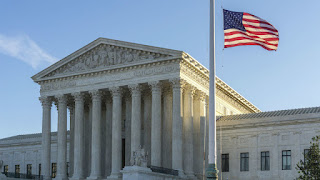Why the next Supreme Court Justice pick is so important
Or, why we don’t want a justice who will overturn Roe v.
Wade
President Trump will be announcing his nomination to fill
the vacancy that will be created when Justice Anthony Kennedy retires. Justice Kennedy’s surprise announcement has generated
a lot of discussion on both sides of the aisle.
Liberals are already decrying the death of Roe v. Wade (which, in my
humble opinion isn’t a bad thing) and conservatives are saying they want a
Justice that will overturn Roe v. Wade.
Both sides have made their positions clear: keep or destroy Roe v. Wade.
As pro-life as I am, I think both sides have it wrong. And dangerously so. First, a little civics lesson. Article 1, Section 1, places “all legislative
powers” with Congress, the Legislative branch.
The Supreme Court cannot make “law.”
Asserting that the Supreme Court makes the “law of the land” is not only
wrong but un-Constitutional. But why do
people get this wrong? It’s a basic
tenet of our judicial system: stare (pronounced “starry”) decisis. It’s Latin that means, “to stand by things
decided.” It’s about something called
precedent. Basically stated, courts make
rulings based on what other courts have decided in the past. In effect, courts don’t need to retry cases
and litigators don’t need to argue facts with similar circumstances. This is a good thing.
For cases that were not decided correctly or properly, stare
decisis could be a bad thing. Case in
point, the Dredd Scott decision by the Supreme Court in 1857 ruled that Negroes
could not be citizens citing the Constitution as the basis. It was called the 3/5’s compromise; in
essence, slaves could only be could only be counted as 3/5 of a person
[1]. So, to demand a Supreme Court nominee blindly
adhere to stare decisis, especially with Roe v. Wade, is bad for justice. Likewise, to demand that a nominee be
dedicated to overturn Roe v. Wade is just as bad for justice. The Supreme Court has overruled itself 220
times[2]. In fact, Justice Ruth Bader Ginsberg once
stated Roe v. Wade was decided badly[3]. When cases are decided badly, stare decisis
isn’t logical. Badly decided cases need
to be overturned.
You may have heard people call the Constitution a “living,
breathing document.” Such a document is
constantly edited and updated. While the
Constitution allows for amendments, the process for getting an amendment in
place is arduous and lengthy. I believe
the reason for this is to ensure that changes aren’t made during a time of high
emotions. The Constitution is more like
the steel structure that holds up skyscrapers.
Would you want to go to the top of a tower that had an unfirm,
constantly changing support structure? To
further use this analogy, if you build an addition to a building, you don’t
change the original framework, you add on to fit the design you want. I feel
the Constitution is like this to ensure the framework upon which our country is
based remains firm and strong, not bending and yielding to cultural and societal
whims.
Politics and opinions are mainly to blame for badly decided
cases. Political ideology and personal opinions have no place in our judicial
system. Courts must work tirelessly to
ensure that cases are decided on their merits, as presented by the litigants,
and nothing else. A justice with a
particular leaning is a great thing when they lean in your direction. Obviously, a justice were leaning the other
way, it’s a bad thing.
Justices shouldn’t interpret
the law and the Constitution, they should apply
it. What’s the difference? Here’s an example: are hotdogs good or
bad? I personally love all beef hotdogs
(Hebrew National or Nathan’s, by the way).
Anything else but all beef aren’t really hotdogs. But there are those that believe hotdogs are
the worst thing for you. They’re full of
nitrates, salt, fat, and who knows what else.
Suppose you’re a Justice that hates hotdogs and you’re hearing a case/argument
that a hotdog company’s signs shouldn’t be allowed on the public street. How do you rule? You hate hotdogs, so you rule that the signs
shouldn’t be allowed because hotdogs are bad for you. If you uphold the Constitution, you must rule
that the First Amendment allows for free speech (if that’s the company’s
argument). This is an absurd example,
but I hope one that makes my point.
Preservation of justice is the most important thing in our
judicial system. Justices must apply the
law and the Constitution to cases before them.
Preserving the law and the Constitution is the most important thing to
conserving our country. Justices that
make rulings based political bias and opinions are a danger to the
republic. Therefore, I hope President
Trump’s nominee is someone that will preserve the Constitution and make
decisions without inserting personal bias and opinion. Whether Roe v. Wade should be overturned or
not should be irrelevant. If a case,
even this case, was decided badly, it should be overturned. But based on the facts of the case and the
application of law and the Constitution.
But what do I know? I’m
no legal expert … this is just my 2 cents worth.
[1]
http://www.newworldencyclopedia.org/entry/Dred_Scott_v._Sandford
[2]
https://www.gpo.gov/fdsys/pkg/GPO-CONAN-2002/pdf/GPO-CONAN-2002-12.pdf
[3]
https://www.washingtonpost.com/politics/courts_law/the-forgotten-history-of-justice-ginsburgs-criticism-of-roe-v-wade/2016/03/01/9ba0ea2e-dfe8-11e5-9c36-e1902f6b6571_story.html?noredirect=on&utm_term=.3bfb48f3d671

Comments
Post a Comment